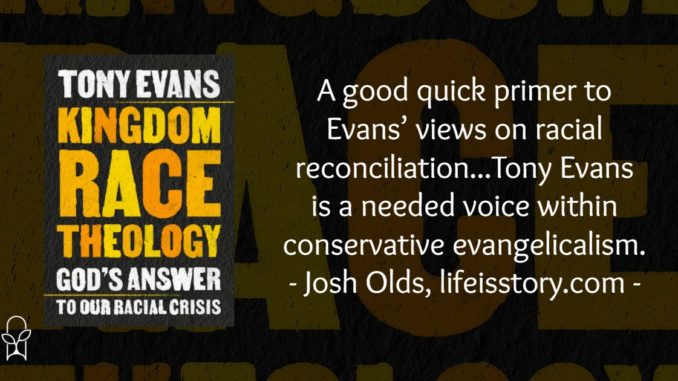
Also by this author: Kingdom Stewardship, Kingdom Encounters: Experiencing More of God When Life Hurts, Hope for the Hurting
Published by Moody Publishers on January 4, 2022
Genres: Non-Fiction, Racial Reconciliation
Buy on Amazon
Goodreads

The 2020 murder of George Floyd ignited a racial firestorm throughout America, provoking lament and grief over a long history of tragedy. The widespread protests gave way to a heated discussion about terms such as systemic racism, white privilege, and Critical Race Theory, all framed by the slogan “black lives matter.” The beginnings of a helpful dialogue on diversity became a heated battle, one that quickly spread to the church.
Drawing on forty years of ministry experience, Tony Evans writes with a fearless and prophetic voice, probing to the heart of the issue and pointing to God’s Word as the solution. Kingdom Race Theology helps people and churches commit to restitution, reconciliation, and responsibility. His penetrating and practical ideas will help pastors and church leaders sort through the conflicting theories, finding sensible solutions in the form of individual and collective action plans. Christians can work together across racial lines to repair the damage done by a long history of racial injustice.
Kingdom Race Theology: God’s Answer to Our Racial Crisis is an adapted version of Tony Evans’ larger work, Oneness Embraced. Specifically, the four chapters of this book come from chapters 10, 12, 15, and 16 from that book. So, if you’re wanting to get to the heart of Evans’ work in racial reconciliation quickly, this book might be for you. If you’d rather hear what Evans has to say in greater context, you’re better off picking up Oneness Embraced.
For me, Kingdom Race Theology was a good introduction to Evans, a long-standing stalwart in the Black evangelical community. In reflecting on race and racial conciliation, I’ve read a lot of more progressive voices—Willie Jennings, Brenda Salter McNeil, James Cone, Brian Bantum, Jemar Tisby, Osheta Moore, the list goes on—but I had not read as many Black voices that have stayed within the evangelical community (Southern Baptists, particularly) as they reckon with the racism of their past and present. Tony Evans is probably the most well-known Black Southern Baptist leader so, when he writes on racial issues, it’s worth getting his perspective.
In many ways, Tony Evans and Kingdom Race Theology is a bridge that allows white evangelicals to feel comfortable talking about race. When Angela Parker starts talking about If God Can Breathe, Why Can’t I? and speaking about how the doctrine of inerrancy has enabled racist systems, most white conservative evangelicals aren’t going to listen. Even when relatively conservative Jemar Tisby speaks on race, a lot of white conservative evangelicals tune him out. But Tony Evans strikes a tone that manages to be both irenic and challenging. Some can criticize for not being challenging him enough. Some can criticize for engaging it what’s sometimes called Black respectability politics. But the fact remains that, overall, evangelicals are willing to listen to Evans as a Black voice, so it’s important to know what he has to say.
The first chapter of the book is about the need for Kingdom Race Theology. Evans begins with the murder of George Floyd—which he clearly defines as a murder. From here, he defines (as he sees it) Black Lives Matter (BLM), Critical Race Theory (CRT), The 1619 Project, and systemic racism. In brief, Evans believes BLM has merit for its goal of correcting social injustice while being critical of the formal organization; he correctly defines CRT and doesn’t say much in the way of evaluating it; he does not believe the 1619 Project is accurate and instead points to a Black-led movement called 1776 Unites; and cogently and succinctly defines and gives examples of systemic racism. The clarity, humility, and irenic tone really go a long way. Even when I don’t fully agree with Evans, I can get behind his compassion and his goals.
The second chapter defines “Kingdom Race Theology” as “the reconciled recognition, affirmation, and celebration of the divinely created ethnic differences through which God displays His multifaceted glory and advances his rule in history.” Racism, then, is a Kingdom issue, not just a cultural or social one. He calls on white people to repent of racist attitudes and thoughts. He calls on Black people to forgive and build bridges. He does not back down from or attempt to whitewash the past, but calls all people to come together as one in the present.
The third chapter sets the focus for Kingdom Race Theology. Of particular note here, Evans recalls a conversation he had with Billy Graham. Graham was frustrated that the diverse churches in a community would come together for outreach in a Crusade, but not maintain that togetherness after Graham left. Evans suggested that it was because the Black church had a more expansive view of the Gospel that extended out toward community and justice and that majority white churches were seldom comfortable with that.
The four chapters concludes the book with bulleted lists entitled: “What Black Christians Should Do,” “What White Christians Should Do,” and “What Churches Should Do.” The things Evans includes are sometimes easy to say but much more difficult than a bullet point makes it seem. Whole volumes could (and have) been written about each point, meaning the brevity of Evans’ work leaves him without much room for nuance.
Overall, Kingdom Race Theology is a good quick primer to Evans’ views on racial reconciliation. Whether it’s because Evans’ views are idealistic or because of the size of the book, some of his teaching comes across as rather simplistic, making solutions sound like an easy checklist. However, it could also be that Evans understands his audience and knows that things must be kept simple and easy. While I myself tend to be more progressive and more radical, Evans’ theology and writing is a needed voice within conservative evangelicalism.
